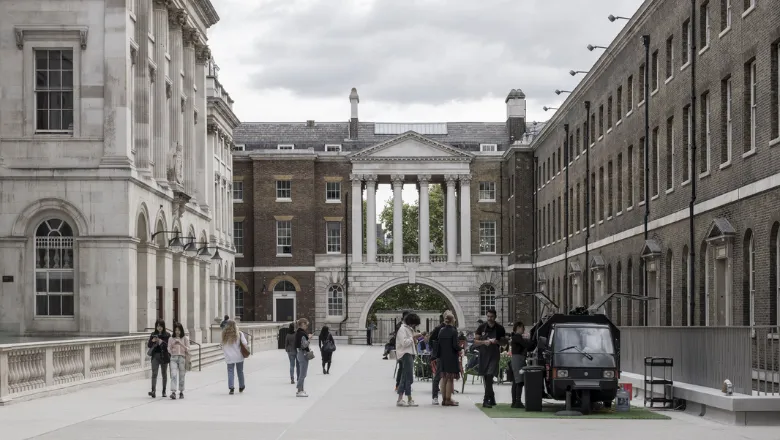Faculty of Natural, Mathematical & Engineering Sciences
The Faculty Office is based in the heart of London at Strand Campus
Application has passed - page retained for reference only
King’s College London is an internationally renowned university delivering exceptional education and world-leading research. We are dedicated to driving positive and sustainable change in society and realising our vision of making the world a better place. Through our commitment to exceptional education, impactful research, and genuine service to society, we are creating positive change in our communities, both in London and on the world stage. Our Vision 2029 looks forward to our 200th anniversary in 2029 and sets out our ambitious plans in five key areas: • Educating the next generation of change-makers; • Challenging ideas and driving change through research; • Giving back to society through meaningful service; • Working with our local communities in London; • Fostering global citizens with an international perspective. King’s comprises nine faculties, each with an academic leader and professional services lead: Executive Dean of Faculty and Director of Operations. Professional Services are provided in every Faculty as well as centrally to deliver support services for students and staff.
• Faculty of Arts & Humanities • Faculty of Dentistry, Oral & Craniofacial Sciences • Faculty of Life Sciences & Medicine • Faculty of Natural, Mathematical & Engineering Sciences • Faculty of Social Science & Public Policy • Florence Nightingale Faculty of Nursing, Midwifery & Palliative Care • Institute of Psychiatry, Psychology & Neuroscience • King’s Business School • The Dickson Poon School of Law
Delivering sustainable academic excellence. We are a vibrant faculty based in the heart of London with a long tradition of world-leading research and teaching in physics, mathematics, chemistry, computer science and engineering. Our internationally renowned scientists are working across traditional subject boundaries, leading cutting-edge research, tackling global challenges, and answering fundamental questions about our universe.
Reports to: Professor Rachel Bearon
Competitive salary
There are two elements to this appointment: • Head of Department of Mathematics. This appointment will be for four years in the first instance, on an additional and separate contract to that of the substantive appointment. With the potential for a subsequent renewal following a review process. • The substantive appointment is an ongoing academic contract, a permanent member of the academic staff of King’s College London. It is expected, but not a requirement, that the appointee will meet the criteria for an appointment at professorial level.
Full time (35 hours per week)
Strand Campus
081566

The main purpose of the role of Head of Department is: • To provide strategic leadership and management of the Department and develop and deliver the strategic objectives of the Department, Faculty, and University. • To embed equality, diversity and inclusion in all practices and processes to empower all individuals to be able to contribute fully to the success of the Department. • To inspire staff to achieve the highest standards in research, teaching, and professional conduct. • To work closely with the Executive Dean, Vice-Deans, heads of other departments, Director of Operations and professional services leadership within the Faculty, to ensure the delivery of the core activities of the Department . • To work in partnership with professional services to ensure effective and efficient use of Departmental resources, in a manner consistent with Faculty and University policy.

• To participate in the strategic management of the Faculty as a member of the Faculty Executive Board. • To be responsible for the recruitment, induction, management, performance, and welfare of Departmental academic staff, ensuring that probation, performance development reviews, disciplinary, career development and other responsibilities are undertaken in accordance with agreed University policies and guidelines, and to support those whose performance is assessed as requiring it. • To support and develop academic leadership in the department and provide appropriate opportunities for accruing experience in leadership roles, to ensure that staff are suitably prepared to take on more senior leadership roles in the future, including succession planning for key leadership positions within the Department. • To take responsibility for the organisational structure and governance of the Department, implementing changes as appropriate to align with Faculty and University governance, policy, and regulatory frameworks. This includes convening a Department leadership team and holding regular staff meetings. • To ensure that staff and students are appropriately advised to ensure compliance with Faculty and University policies and procedures affecting them. • To be responsible for the management of staff workloads. In the case of academic staff, this includes operating a workload allocation model, seeking to equitably balance teaching, research, administrative and other duties.
To work with the Executive Dean, Vice Deans, Director of Operations, and professional services support: • To ensure the Department operates within the financial regulations and procedures of the University and to ensure that all financial and academic performance targets are met. • To be responsible for the formulation and development of Departmental plans, consistent with the integrated planning requirements of the Faculty and University. • To be responsible for performance in the Department overall so that it aligns with Key Performance Indicators and targets set by the Faculty and University. This will encompass all key performance areas beyond financial performance, including but not limited to NSS, PTES and student recruitment. • To ensure appropriate usage of space within the space envelope made available to the Department, working with the Faculty to ensure compliance with the space management policy. • To work closely with faculty academic and professional services leads in a cross-faculty manner to ensure that the Department has effective resource management plans in place for business continuity in the event of disruption to buildings, processes, systems, or staffing which are aligned with other departments and the faculty.
To work with the Vice-Dean Education, Deputy Head Education, and professional services support: • To ensure that the Department continues to deliver high-quality teaching and learning within a suite of outstanding degree programmes at all levels. • To ensure that the Department provides an appropriate learning environment to fully optimise the student experience. • To ensure appropriate levels of support in accordance with Faculty and University policies for the academic progression and welfare of students registered within the Department. • To provide leadership in the preparation for audit and other quality assurance activities including professional accreditation.

To work with the Vice-Dean Research, Deputy Head Research, and professional services support: • To use their leading research profile to inspire the department to continually improve the quality of its research. • To ensure that the Department promotes and fosters a culture of research excellence with appropriate research governance and the associated procedures including peer review and monitoring research performance. • To advise and lead on strategic research initiatives (increasing research funding bids, winning larger grants, preparing for fellowships, multidisciplinary research, Research Excellence Framework (REF) submissions etc.) • To champion a research culture that attracts, develops, and retains our academics, researchers and post-graduate students.
To work with the Vice-Dean Enterprise & Engagement, Department Leads, and professional services support: • To develop an impact and innovation strategy for the Department, which reflects the Faculty and College strategies, including Knowledge with purpose: Service and Impact and the One King’s Impact Challenges • To promote and embed an effective culture of E&E and provide an environment that stimulates and supports entrepreneurial thinking, external engagement and innovation. • To be responsible for optimising impact and knowledge exchange performance and submissions for the Department in REF and KEF evaluations.
To work with the Chair of the Faculty H&S Committee, Director of Operations, and professional services support: • To ensure that Health, Safety, Welfare and Environmental Sustainability practice in the Department complies with University policy and regulations, taking professional advice where appropriate from within the Faculty and the University. • To be responsible for ensuring the University Regulations, Rules and Codes of Practice are always observed by staff and students. • To ensure that the Departmental arrangements will be implemented to meet University requirements for Health, Safety, Welfare and Environmental Sustainability.
• To carry out other duties as may reasonably be required by the Executive Dean.
The Faculty Office is based in the heart of London at Strand Campus
Welcome to the Department of Mathematics at King's College London
Mathematics Research Groups
King’s College London is a leading centre for the study of mathematics in the UK.
Department of Mathematics Undergraduate
Department of Mathematics Postgraduate
• PhD in a relevant area of Mathematical Sciences or a closely related subject • To have developed a strong and distinctive research vision and record within the mathematical sciences, which complements existing research in the Department • Evidence of significant impact in the field • Ability to think strategically and contribute at a senior level to the Department, NMES and King’s • Excellent interpersonal and communication skills, with the ability to listen, engage and persuade • Excellent administrative and operational skills • Possess in-depth understanding of the discipline to enable the development of new knowledge, innovation and understanding within the field • Ability to provide inclusive academic leadership • Ability to both lead and work within a team • Ability to plan and prioritise workload • Ability to understand institutional management systems and the wider higher education environment • Highly effective oral and written communication skills, to convey conceptual and complex ideas and information • Creative problem solver • Proactive in creating and developing interactions and collaborations with colleagues • To have developed a strong and distinctive research vision within the field, which complements existing research in the Department and consistent with the future strategic research direction of King’s • An outstanding and inspiring record of achievement in research and publication recognised as internationally leading • Proven ability to attract substantial research funding over a sustained period • Proven ability to build an internationally leading research group and successfully manage and promote that group’s research within an international arena
• Established external links including with industry, academic societies, government and/or charted/professional bodies

The King’s Factor is a free after-school programme that brings together students from Year 12 and Year 13
Maths Circles & Battles are free of charge for all students of the school years 7 to 11.
King's Maths School has a vision to promote the mathematical sciences at A Level and beyond.

We come together with a shared purpose and vision: To advance and promote academic excellence and impact in Natural, Mathematical & Engineering Sciences (NMES) for the benefit of our students, staff, knowledge, and society. To deliver academic excellence and impact, future prosperity in a digital and sustainable world relies on our education and research drawing on strong core disciplines and collaboration between disciplines to enhance student learning and speed up discovery and innovation. Interdisciplinarity is at the centre of our academic activities and will be based on key identified themes. We are promoting an inclusive environment for staff and students alike and building a culture of thriving enterprise and innovation, working together with a range of industrial and international academic partners and organisations.
For students, we offer a wide-ranging portfolio of undergraduate, MSc and PhD programmes. Studying with us enables students to work with, and learn from, world-leading academics while benefiting from a wealth of support. With nearly 5,000 undergraduate and postgraduate students and around 350 academic and research staff, our ambition is to inspire, educate and innovate - fostering the next generation of scientists and future leaders. We count Nobel Laureates among our distinguished former staff and students, and we are committed to promoting the careers of women working in science, technology, engineering, and mathematics.
1. Department of Chemistry 2. Department of Engineering 3. Department of Informatics 4. Department of Mathematics 5. Department of Physics
Our unrivalled central London location has enabled us to foster close ties with business, industry and government, and we are within easy reach of major research libraries and leading scientific societies such as the Royal Society, Royal Society of Chemistry, BCS - The Chartered Institute for IT, the Institute of Physics, the Institution of Engineering and Technology (IET), the Institution of Mechanical Engineers (IMechE), the London Mathematical Society and the Royal Statistical Society.

Supported by significant university investment, the faculty is in a period of ambitious growth and investment, which aims to build upon current strengths in natural and mathematical sciences and establish King’s as an outstanding global institution in science and technology.
The Department of Mathematics at King’s College London has a distinguished scientific tradition in pure and applied mathematics and statistics. Since its foundation in 1830, it has established a reputation as a world-leading centre for the research, undergraduate study and postgraduate study of mathematics. The department has grown by 32% over four years to 77 academics and has made advances in equality and diversity with the successful hiring and raising the profile of female staff. This year we welcomed 264 undergraduates, 203 postgraduates, and 24 PhD students, with overall student figures having grown 11% over the past four years. The study of mathematics has never been more important nor more highly valued than it is today. Whether at undergraduate or postgraduate level, mathematics covers a huge spectrum of fascinating topics and addresses fundamental questions about the universe, whether through new discoveries or applications. Our courses offer a wide range of required and optional modules in pure and applied mathematics, with topics that include pure mathematics, string theory, data analysis, and mathematical finance amongst others. We aim to develop graduates with a pioneering mindset through research-led teaching which explores new ways of looking at familiar issues and develops new tools to solve complex problems. Our broad education portfolio, influenced by the research interests and activities of our academic staff, includes three-year BSc courses in Mathematics, Mathematics with Management and Finance, and Mathematics with Statistics, with optional pathways to study abroad or in industry, and a four-year MSci course in Mathematics. Postgraduate taught students can follow one of 5 MSc courses in Mathematics, Financial Mathematics, Complex Systems Modelling, Theoretical Physics and Statistics, and postgraduate research students receive supervision and support from one of the 8 departmental research groups.
• Analysis • Disordered Systems • Financial Mathematics • Geometry • Number Theory • Probability • Statistics • Theoretical Physics All research groups run their own seminar series and lead in the organisiation of conferences and other research meetings. As well as advancing our core disciplines, our staff are involved in interdisciplinary research collaborations both internally within King’s and externally. They have formed partnerships with colleagues in all departments within the Faculty , and across the institution, for example with the Randall Centre for Cell and Molecular Biophysics, part of the Faculty of Life Sciences and Medicine. Externally they work with the Francis Crick Institute and industrial partners such as EDF Research, the Pensions Policy Institute, and Unilever. Research income for the department is on a rising trajectory, having almost tripled in the last 5 years. The Department is committed to Outreach activity and boasts a number of impressive widening participation initiatives aligned with the Faculty’s overall mission to provide young people, their supporters and our local communities with high-quality STEM engagement opportunities. This includes The King’s Factor, a free after-school programme aimed at supporting Year 12 and 13 students to build their maths skills. Maths Circles are aimed at pupils in years 7-11 and provide training sessions to promote problem-solving and structured thinking. We have a strong partnership with the King’s College London Mathematics School, recently enhanced through the appointment of its founding head as a Professor of Practice in the Department of Mathematics.

Our vision is to make the world a better place
Responding to fundamental biological questions across disciplines
King’s is one of three founding universities in the Francis Crick Institute
Application has passed - page retained for reference only
Please quote the vacancy id: 081566 in all correspondence.
Closing date for applications: 26 February 2024 23:59
Interview date: 26 March 2024
Second interview date: 25 April 2024
To apply for this post you will need to register on the King’s College London jobs page and submit the application form, along with the following: • a concise statement setting out your reasons for applying for the post and highlighting the particular skills and experience which you feel you would bring to the role (two pages maximum) • a curriculum vitae Applications must be made electronically in Word or PDF format. Please ensure you quote reference number 081566 on all correspondence.
King’s College London is committed to equality, diversity, and inclusion and through this appointment process it is the university’s clear stated aim to develop candidate pools that include applicants from all backgrounds and communities. We particularly encourage applications from women, people from black and minority ethnic communities, the LGBT+ community and from disabled people.
For an informal discussion or to find out more about the role please contact the King’s Search Team.

Applications will be shortlisted by a selection committee drawn from across the Faculty. Shortlisted candidates will be invited to a two-stage interview process and stakeholder engagement. The final interview panel will take place on 25 April 2024 chaired by the Senior Vice President (Academic) with representatives from across the Faculty and Department.
The Faculty of Natural, Mathematical & Engineering Sciences is committed to ensuring an inclusive interview process and will reimburse up to £250 towards any additional care costs (for a dependent child or adult) incurred as a result of attending an interview.
Current vacancies and career opportunities

The main purpose of the role of Head of Department is: • To provide strategic leadership and management of the Department and develop and deliver the strategic objectives of the Department, Faculty, and University. • To embed equality, diversity and inclusion in all practices and processes to empower all individuals to be able to contribute fully to the success of the Department. • To inspire staff to achieve the highest standards in research, teaching, and professional conduct. • To work closely with the Executive Dean, Vice-Deans, heads of other departments, Director of Operations and professional services leadership within the Faculty, to ensure the delivery of the core activities of the Department . • To work in partnership with professional services to ensure effective and efficient use of Departmental resources, in a manner consistent with Faculty and University policy.

• To participate in the strategic management of the Faculty as a member of the Faculty Executive Board. • To be responsible for the recruitment, induction, management, performance, and welfare of Departmental academic staff, ensuring that probation, performance development reviews, disciplinary, career development and other responsibilities are undertaken in accordance with agreed University policies and guidelines, and to support those whose performance is assessed as requiring it. • To support and develop academic leadership in the department and provide appropriate opportunities for accruing experience in leadership roles, to ensure that staff are suitably prepared to take on more senior leadership roles in the future, including succession planning for key leadership positions within the Department. • To take responsibility for the organisational structure and governance of the Department, implementing changes as appropriate to align with Faculty and University governance, policy, and regulatory frameworks. This includes convening a Department leadership team and holding regular staff meetings. • To ensure that staff and students are appropriately advised to ensure compliance with Faculty and University policies and procedures affecting them. • To be responsible for the management of staff workloads. In the case of academic staff, this includes operating a workload allocation model, seeking to equitably balance teaching, research, administrative and other duties.
To work with the Executive Dean, Vice Deans, Director of Operations, and professional services support: • To ensure the Department operates within the financial regulations and procedures of the University and to ensure that all financial and academic performance targets are met. • To be responsible for the formulation and development of Departmental plans, consistent with the integrated planning requirements of the Faculty and University. • To be responsible for performance in the Department overall so that it aligns with Key Performance Indicators and targets set by the Faculty and University. This will encompass all key performance areas beyond financial performance, including but not limited to NSS, PTES and student recruitment. • To ensure appropriate usage of space within the space envelope made available to the Department, working with the Faculty to ensure compliance with the space management policy. • To work closely with faculty academic and professional services leads in a cross-faculty manner to ensure that the Department has effective resource management plans in place for business continuity in the event of disruption to buildings, processes, systems, or staffing which are aligned with other departments and the faculty.
To work with the Vice-Dean Education, Deputy Head Education, and professional services support: • To ensure that the Department continues to deliver high-quality teaching and learning within a suite of outstanding degree programmes at all levels. • To ensure that the Department provides an appropriate learning environment to fully optimise the student experience. • To ensure appropriate levels of support in accordance with Faculty and University policies for the academic progression and welfare of students registered within the Department. • To provide leadership in the preparation for audit and other quality assurance activities including professional accreditation.

To work with the Vice-Dean Research, Deputy Head Research, and professional services support: • To use their leading research profile to inspire the department to continually improve the quality of its research. • To ensure that the Department promotes and fosters a culture of research excellence with appropriate research governance and the associated procedures including peer review and monitoring research performance. • To advise and lead on strategic research initiatives (increasing research funding bids, winning larger grants, preparing for fellowships, multidisciplinary research, Research Excellence Framework (REF) submissions etc.) • To champion a research culture that attracts, develops, and retains our academics, researchers and post-graduate students.
To work with the Vice-Dean Enterprise & Engagement, Department Leads, and professional services support: • To develop an impact and innovation strategy for the Department, which reflects the Faculty and College strategies, including Knowledge with purpose: Service and Impact and the One King’s Impact Challenges • To promote and embed an effective culture of E&E and provide an environment that stimulates and supports entrepreneurial thinking, external engagement and innovation. • To be responsible for optimising impact and knowledge exchange performance and submissions for the Department in REF and KEF evaluations.
To work with the Chair of the Faculty H&S Committee, Director of Operations, and professional services support: • To ensure that Health, Safety, Welfare and Environmental Sustainability practice in the Department complies with University policy and regulations, taking professional advice where appropriate from within the Faculty and the University. • To be responsible for ensuring the University Regulations, Rules and Codes of Practice are always observed by staff and students. • To ensure that the Departmental arrangements will be implemented to meet University requirements for Health, Safety, Welfare and Environmental Sustainability.
• To carry out other duties as may reasonably be required by the Executive Dean.
The Faculty Office is based in the heart of London at Strand Campus
Welcome to the Department of Mathematics at King's College London
Mathematics Research Groups
King’s College London is a leading centre for the study of mathematics in the UK.
Department of Mathematics Undergraduate
Department of Mathematics Postgraduate
• PhD in a relevant area of Mathematical Sciences or a closely related subject • To have developed a strong and distinctive research vision and record within the mathematical sciences, which complements existing research in the Department • Evidence of significant impact in the field • Ability to think strategically and contribute at a senior level to the Department, NMES and King’s • Excellent interpersonal and communication skills, with the ability to listen, engage and persuade • Excellent administrative and operational skills • Possess in-depth understanding of the discipline to enable the development of new knowledge, innovation and understanding within the field • Ability to provide inclusive academic leadership • Ability to both lead and work within a team • Ability to plan and prioritise workload • Ability to understand institutional management systems and the wider higher education environment • Highly effective oral and written communication skills, to convey conceptual and complex ideas and information • Creative problem solver • Proactive in creating and developing interactions and collaborations with colleagues • To have developed a strong and distinctive research vision within the field, which complements existing research in the Department and consistent with the future strategic research direction of King’s • An outstanding and inspiring record of achievement in research and publication recognised as internationally leading • Proven ability to attract substantial research funding over a sustained period • Proven ability to build an internationally leading research group and successfully manage and promote that group’s research within an international arena
• Established external links including with industry, academic societies, government and/or charted/professional bodies

The King’s Factor is a free after-school programme that brings together students from Year 12 and Year 13
Maths Circles & Battles are free of charge for all students of the school years 7 to 11.
King's Maths School has a vision to promote the mathematical sciences at A Level and beyond.

We come together with a shared purpose and vision: To advance and promote academic excellence and impact in Natural, Mathematical & Engineering Sciences (NMES) for the benefit of our students, staff, knowledge, and society. To deliver academic excellence and impact, future prosperity in a digital and sustainable world relies on our education and research drawing on strong core disciplines and collaboration between disciplines to enhance student learning and speed up discovery and innovation. Interdisciplinarity is at the centre of our academic activities and will be based on key identified themes. We are promoting an inclusive environment for staff and students alike and building a culture of thriving enterprise and innovation, working together with a range of industrial and international academic partners and organisations.
For students, we offer a wide-ranging portfolio of undergraduate, MSc and PhD programmes. Studying with us enables students to work with, and learn from, world-leading academics while benefiting from a wealth of support. With nearly 5,000 undergraduate and postgraduate students and around 350 academic and research staff, our ambition is to inspire, educate and innovate - fostering the next generation of scientists and future leaders. We count Nobel Laureates among our distinguished former staff and students, and we are committed to promoting the careers of women working in science, technology, engineering, and mathematics.
1. Department of Chemistry 2. Department of Engineering 3. Department of Informatics 4. Department of Mathematics 5. Department of Physics
Our unrivalled central London location has enabled us to foster close ties with business, industry and government, and we are within easy reach of major research libraries and leading scientific societies such as the Royal Society, Royal Society of Chemistry, BCS - The Chartered Institute for IT, the Institute of Physics, the Institution of Engineering and Technology (IET), the Institution of Mechanical Engineers (IMechE), the London Mathematical Society and the Royal Statistical Society.

Supported by significant university investment, the faculty is in a period of ambitious growth and investment, which aims to build upon current strengths in natural and mathematical sciences and establish King’s as an outstanding global institution in science and technology.
The Department of Mathematics at King’s College London has a distinguished scientific tradition in pure and applied mathematics and statistics. Since its foundation in 1830, it has established a reputation as a world-leading centre for the research, undergraduate study and postgraduate study of mathematics. The department has grown by 32% over four years to 77 academics and has made advances in equality and diversity with the successful hiring and raising the profile of female staff. This year we welcomed 264 undergraduates, 203 postgraduates, and 24 PhD students, with overall student figures having grown 11% over the past four years. The study of mathematics has never been more important nor more highly valued than it is today. Whether at undergraduate or postgraduate level, mathematics covers a huge spectrum of fascinating topics and addresses fundamental questions about the universe, whether through new discoveries or applications. Our courses offer a wide range of required and optional modules in pure and applied mathematics, with topics that include pure mathematics, string theory, data analysis, and mathematical finance amongst others. We aim to develop graduates with a pioneering mindset through research-led teaching which explores new ways of looking at familiar issues and develops new tools to solve complex problems. Our broad education portfolio, influenced by the research interests and activities of our academic staff, includes three-year BSc courses in Mathematics, Mathematics with Management and Finance, and Mathematics with Statistics, with optional pathways to study abroad or in industry, and a four-year MSci course in Mathematics. Postgraduate taught students can follow one of 5 MSc courses in Mathematics, Financial Mathematics, Complex Systems Modelling, Theoretical Physics and Statistics, and postgraduate research students receive supervision and support from one of the 8 departmental research groups.
• Analysis • Disordered Systems • Financial Mathematics • Geometry • Number Theory • Probability • Statistics • Theoretical Physics All research groups run their own seminar series and lead in the organisiation of conferences and other research meetings. As well as advancing our core disciplines, our staff are involved in interdisciplinary research collaborations both internally within King’s and externally. They have formed partnerships with colleagues in all departments within the Faculty , and across the institution, for example with the Randall Centre for Cell and Molecular Biophysics, part of the Faculty of Life Sciences and Medicine. Externally they work with the Francis Crick Institute and industrial partners such as EDF Research, the Pensions Policy Institute, and Unilever. Research income for the department is on a rising trajectory, having almost tripled in the last 5 years. The Department is committed to Outreach activity and boasts a number of impressive widening participation initiatives aligned with the Faculty’s overall mission to provide young people, their supporters and our local communities with high-quality STEM engagement opportunities. This includes The King’s Factor, a free after-school programme aimed at supporting Year 12 and 13 students to build their maths skills. Maths Circles are aimed at pupils in years 7-11 and provide training sessions to promote problem-solving and structured thinking. We have a strong partnership with the King’s College London Mathematics School, recently enhanced through the appointment of its founding head as a Professor of Practice in the Department of Mathematics.

Our vision is to make the world a better place
Responding to fundamental biological questions across disciplines
King’s is one of three founding universities in the Francis Crick Institute
Application has passed - page retained for reference only
Please quote the vacancy id: 081566 in all correspondence.
Closing date for applications: 26 February 2024 23:59
Interview date: 26 March 2024
Second interview date: 25 April 2024
To apply for this post you will need to register on the King’s College London jobs page and submit the application form, along with the following: • a concise statement setting out your reasons for applying for the post and highlighting the particular skills and experience which you feel you would bring to the role (two pages maximum) • a curriculum vitae Applications must be made electronically in Word or PDF format. Please ensure you quote reference number 081566 on all correspondence.
King’s College London is committed to equality, diversity, and inclusion and through this appointment process it is the university’s clear stated aim to develop candidate pools that include applicants from all backgrounds and communities. We particularly encourage applications from women, people from black and minority ethnic communities, the LGBT+ community and from disabled people.
For an informal discussion or to find out more about the role please contact the King’s Search Team.

Applications will be shortlisted by a selection committee drawn from across the Faculty. Shortlisted candidates will be invited to a two-stage interview process and stakeholder engagement. The final interview panel will take place on 25 April 2024 chaired by the Senior Vice President (Academic) with representatives from across the Faculty and Department.
The Faculty of Natural, Mathematical & Engineering Sciences is committed to ensuring an inclusive interview process and will reimburse up to £250 towards any additional care costs (for a dependent child or adult) incurred as a result of attending an interview.
Current vacancies and career opportunities